D-FlexTM Logbook Pen Injector Add-On
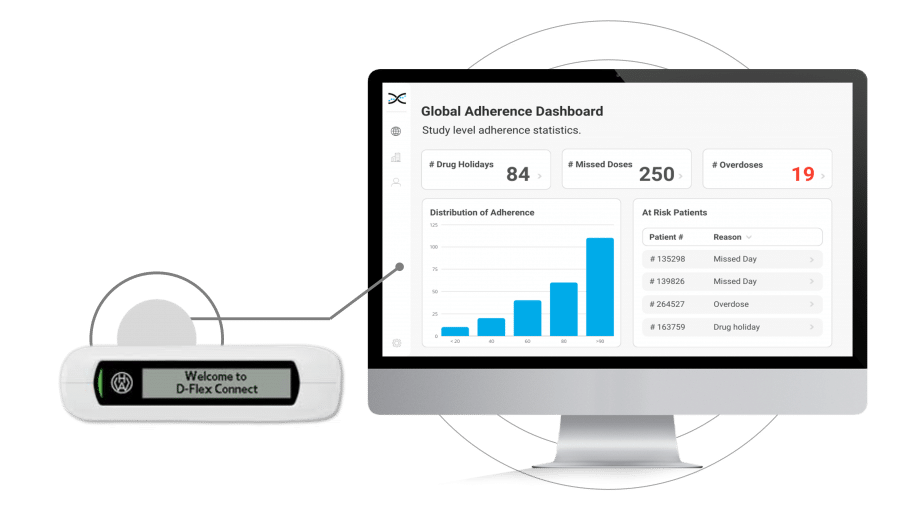
Introducing the D-Flex Logbook, a cutting-edge drug delivery solution developed by medmix, a Haselmeier company. Designed for self-injectable medications, this innovative solution includes the D-Flex disposable pen injector and a connected cap that captures medication event data at the point of administration. With the D-Flex Logbook, participants can enjoy a connected and convenient solution for managing their adherence to treatment, while sponsors can benefit from real-time treatment adherence analytics thanks to the solution’s seamless integration with AARDEX Group’s medication adherence software, MEMS AS®.
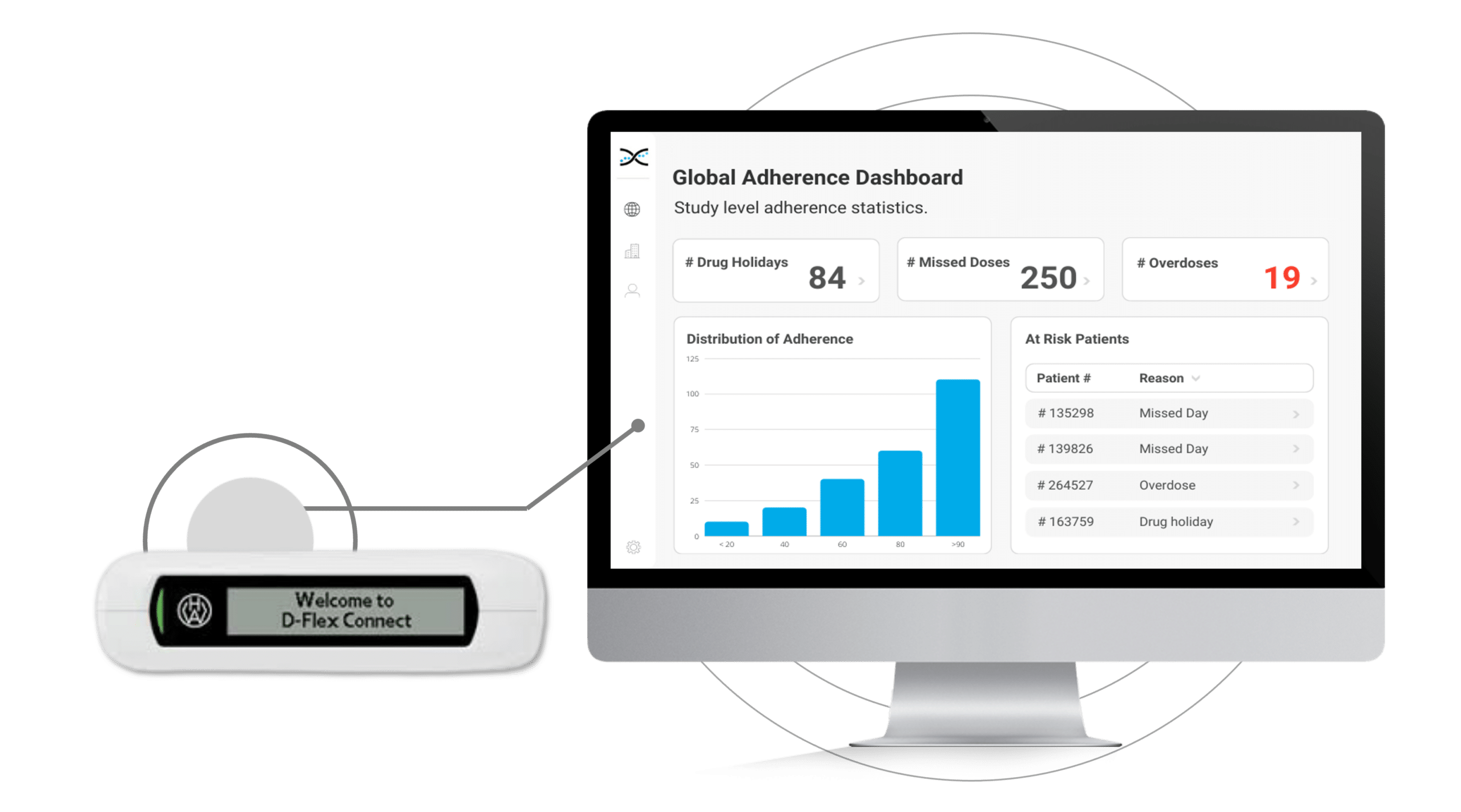

D-Flex LOGBOOK
Real-Time Adherence Insights for
Self-Injectable Medications
Adherence to self-injectable treatments is crucial to monitor in clinical trials for several reasons. Medication adherence directly impacts the effectiveness of the treatment under investigation. Suppose participants fail to adhere to the prescribed dosing regimen. In that case, it can significantly compromise the accuracy and validity of the trial results, making it difficult to determine the actual effectiveness of the medication.
How to Use The D-Flex Logbook
The D-Flex Logbook offers a convenient, easy-to-use solution for clinical trial participants and researchers alike. Comprising medmix’s disposable D-Flex™ injection pen and the D-Flex™ Connect, a connected pen injector cap, participants remove the cap from the injection pen, dial a dose, self-inject, and put the lid back on the pen; exactly how they would use a pen and a standard protective cap. When the cap is reattached to the pen, the connected cap tracks the dosage administered, the temperature, and the time.The connected cap features connectivity with AARDEX Group’s medication adherence software, MEMS AS. MEMS AS provides researchers with a window into participant treatment adherence, highlighting any behaviors that would be cause for concern, missed days, medication holidays, and overdoses, for example. By utilizing this intelligence, researchers can action coaching and support earlier to help participants stay on schedule with the medication regimen.
Features of the D-FlexTM Logbook Pen Injector Integrated with MEMS AS

FEATURES
Centralized Treatment Adherence Analytics.
The D-Flex Logbook provides a comprehensive solution for clinical researchers to treatment adherence to self-injectable medications. By integrating with our proprietary Medication Adherence Software, MEMS AS, the D-Flex Logbook enables researchers to conveniently track adherence patterns by participant, site, and study through a range of pre-built dashboards and ranked lists. This user-friendly software equips researchers with valuable insights that help them proactively identify adherence issues and take appropriate measures to ensure participants follow their medication regimens accurately.
- Fully Scalable
- ISO27001 Certified Datacenter
- HIPAA & GDPR Compliant
- IRT, EDC & DCT Integration

FEATURES
Less Medication Errors. More Trial Validity.
The D-Flex Logbook is designed to help prevent medication errors by offering a range of safety features. The platform can be set to deliver a single dose or a number of fixed doses, with a proprietary mechanism that prevents unintended dose selection, enhancing safety during medication administration. Additionally, the pre-set volumes can be customized easily, making it a flexible solution for different dosage requirements. By utilizing the D-Flex Logbook, participants are less likely to make medication errors, and clinical researchers can efficiently monitor adherence patterns to improve the accuracy and reliability of study results.
- Tracks up to 1,000 Injections
- Participant-Friendly

FEATURES
Convenient Reminders for Participants.
Eliminating barriers to medication adherence in clinical trials is paramount for optimizing participant outcomes and maintaining research integrity. We recognize the importance of user-friendly solutions that place no burden on participants, simply requiring them to take their medication as prescribed. In addition, our solutions offer participants access to MEMS® Mobile, a convenient app that allows them to schedule medication reminders, helping them to stay on top of their dosing regimen. Our patient-centric approach to medication adherence strives to empower participants and help them achieve better outcomes.
- User-Friendly App
- IoS & Android Compatible
- Available in 25 Languages
- 20K+ Users in 30 Countries
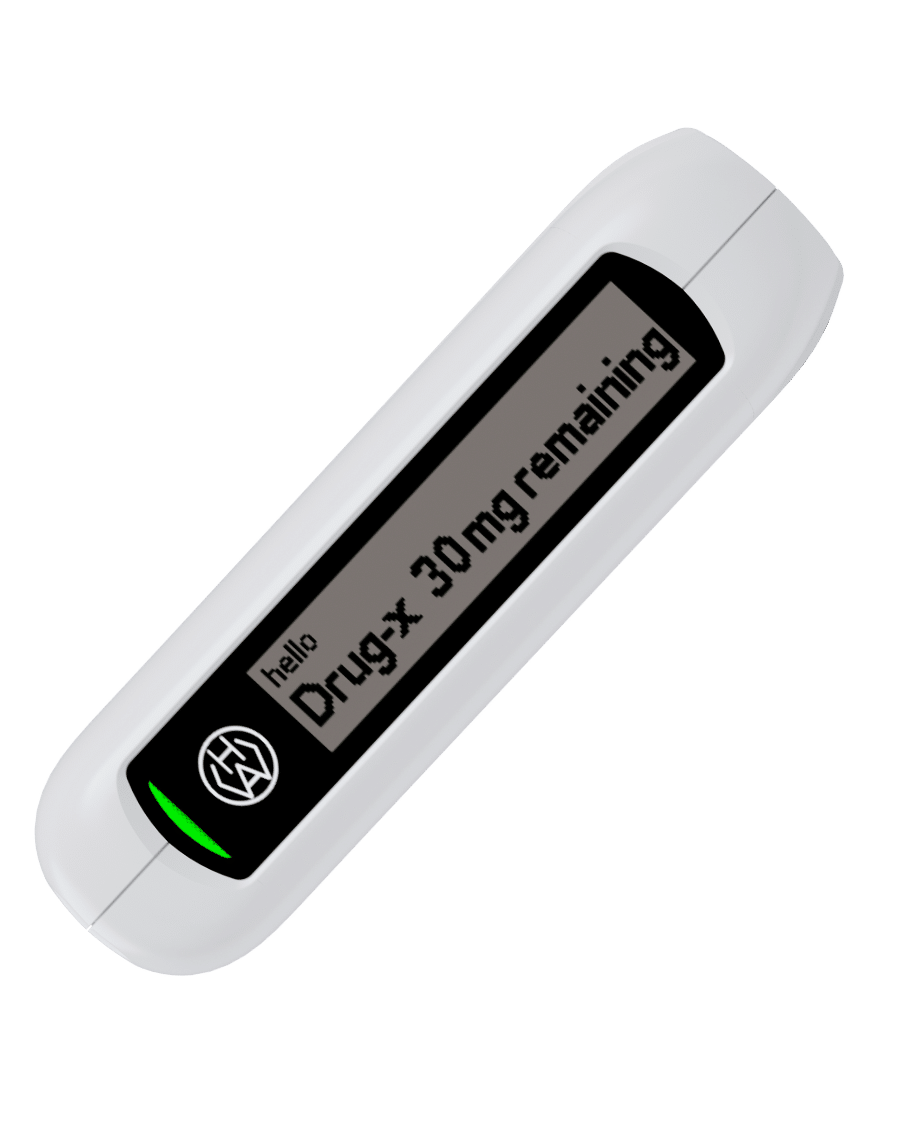
FEATURES
Precise Dose-Tracking Technology.
Presently, the connected cap stands out as the only device that accurately identifies the actual dose delivered by a pen, by analyzing the plunger's position before and after each injection. With six LEDs emitting an IR signal that is modified by the plunger position, and 16 IR sensors detecting the incoming signal, the delta between the two states identifies the relative movement of the plunger, accurately indicating the actual expelled dose during an injection. Additionally, the Connected Cap has the ability to calculate and display the remaining volume in the cartridge. By monitoring the volume in real-time, users can take informed decisions on when to replace the cartridge, improving convenience and minimizing medication waste

OUR CLIENTS
The Go-To Solution for Pharma Companies
Some of the world's leading pharmaceutical companies have embraced our medication adherence solutions. From global giants to niche players, these organizations have recognized the value of our innovative solutions for enhancing medication adherence, reducing costs, and improving patient outcomes. It's an honor to partner with these remarkable brands, and we're proud to contribute to their efforts in advancing healthcare.

Medication Adherence Software →
Learn about our industry-leading adherence software for trials.
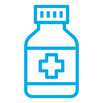
Medication Adherence Packaging →
Discover our range of medication adherence packaging.
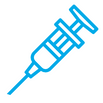
Discover our range of medication adherence devices.
Got Questions?
Connect with an adherence expert.
Frequently Asked Questions
Medication adherence is a vital yet often overlooked aspect of successful research. That's why we've gone the extra mile to gather and organize the most frequently asked questions about this critical topic. Our goal is to empower researchers and patients alike with the knowledge they need to ensure medication adherence is never a hurdle to progress. So, without further ado, here are the answers you've been looking for!
Patient education: Providing patients with comprehensive information about the medication being tested, the treatment regimen, and any potential side effects can help to improve adherence.
Simplified treatment regimen: A simple treatment regimen with fewer doses and a clear dosing schedule can make it easier for patients to adhere to the prescribed treatment.
Patient support: Providing patients with access to support resources, such as a nurse or clinical coordinator, can help them to manage any challenges they may face while adhering to the treatment regimen.
Reminders: Using reminder systems, such as text messages or automated phone calls, can help to remind patients to take their medication at the prescribed times.
Incentives: Offering incentives, such as gift cards or prizes, can encourage patients to adhere to the prescribed treatment regimen.
Technology: Using technology, such as connected pen injectors or medication monitoring systems, can help to track and monitor medication usage, ensuring that patients adhere to the prescribed treatment regimen.
Close monitoring: Regular follow-up visits and medication counseling can help to ensure that patients are adhering to the prescribed treatment regimen and can provide an opportunity to address any issues or concerns that patients may have.
Trust and rapport: Building trust and rapport with patients can help to enhance adherence, as patients are more likely to adhere to the treatment regimen if they trust and have a good relationship with their healthcare provider.
By addressing these factors and using a combination of strategies, healthcare providers and researchers can help to improve medication adherence in clinical trials, ensuring that the study results are accurate and reliable and maximizing the potential benefits of the treatment being tested.
Complexity of administration: Some injectable medications may require complex administration techniques or multiple steps, making it challenging for patients to administer the injection properly.
Lack of understanding: Some patients may not fully comprehend the importance of adherence to their prescribed medication regimen, which can lead to non-adherence.
Disruption to daily life: Injectable medications may require specific storage conditions, timing, or administration techniques, which may be challenging to integrate into patients’ daily routines, leading to non-adherence.
Adverse reactions: Some patients may experience adverse reactions, such as local skin reactions, allergic reactions, or systemic side effects, which can lead to non-adherence.
By combining the D-Flex Logbook and AARDEX Group’s adherence software, researchers can benefit from real-time insights into participant adherence, providing vital clues that prompt more targeted coaching and support conversations.
Treatment adherence refers to the degree to which patients take their medications as prescribed. In other words, treatment adherence measures how well patients follow the recommended dosage and frequency of their medications over a specific period.
Treatment persistence, on the other hand, refers to the length of time that patients continue to take their medications as prescribed, without any interruptions or discontinuation. It measures the duration of time that patients remain on the medication without a significant gap in treatment.
For example, a patient who takes their medication every day as prescribed by their healthcare provider but stops taking it after a few weeks would be considered non-persistent. In contrast, a patient who takes their medication as prescribed and continues to take it without interruption for the recommended duration would be considered persistent.
Both adherence and persistence are essential factors in determining the effectiveness of a treatment regimen. Ensuring that patients are adherent to their medications over the recommended period is crucial to achieving optimal clinical outcomes. Similarly, ensuring that patients persist with their medication regimen is crucial to achieving long-term therapeutic benefits and preventing disease progression
When patients adhere to the prescribed treatment regimen, it ensures that they receive the full benefit of the medication being tested, making it easier for researchers to accurately evaluate the safety and efficacy of the treatment. This, in turn, can lead to more reliable and accurate study results, which can have a positive impact on the development and availability of life-changing treatments.
On the other hand, when patients are non-adherent to the prescribed treatment regimen, it can compromise the validity of the study results, making it difficult for researchers to accurately evaluate the safety and efficacy of the medication. This can result in the need for larger sample sizes, extended trial timelines, and increased research costs, among other negative consequences.
Therefore, ensuring high levels of medication adherence in clinical trials is critical to maximizing the potential benefits of the treatment being tested and enhancing the accuracy and reliability of study results.
WEBINAR WITH MERCK & BIOGEN
Mitigating the Risk of Poor Adherence in Trials
Watch this live recording with adherence experts from Merck & Biogen to learn about their approach to mitigating the risk of poor adherence in trials.
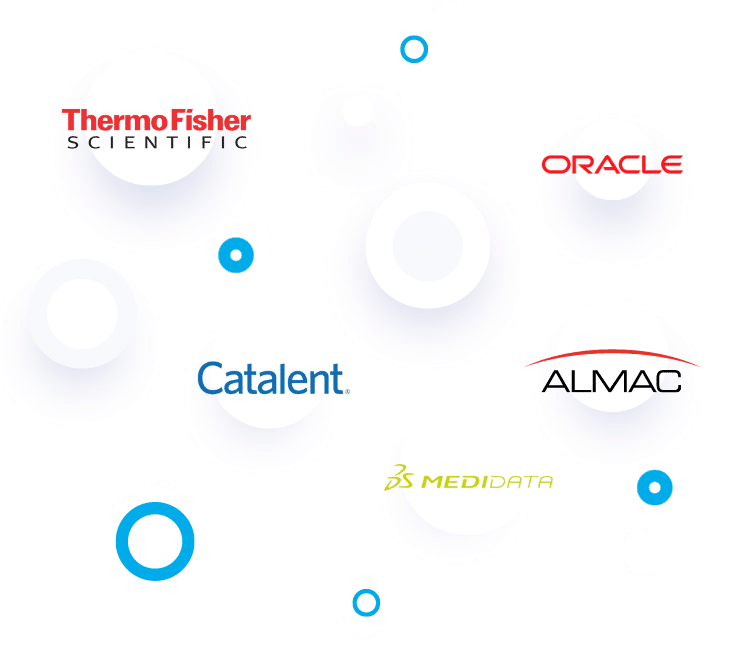

Collaborating for Safer, More Efficient Trials.
By combining technology and partnerships, we are revolutionizing how medication adherence is monitored in clinical trials. Our unique adherence ecosystem brings together leading medication adherence packaging and devices and DCT, IRT, and EDC vendors, CROs, and CMOs to drive innovation.
